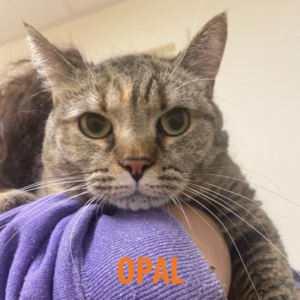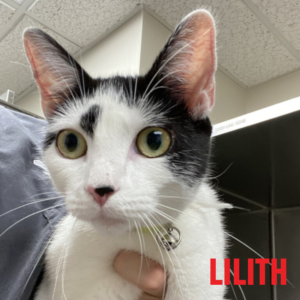By: Humane Pennsylvania Community Outreach Programs Manager, Alexandra Young
June is Adopt-a-Cat Month! Our Community Outreach Programs, Alexandra Young, loves cats so much, she wanted to tell you all about why cats make pawsome pets!
“Many people eagerly await the spring showers and flowers in April, as well as the pleasant warmth of summer temperatures in June. But for people who work and volunteer in animal welfare and cat rescue, spring marks the start of kitten season as free-roaming, outdoor cats start giving birth to litters of up to seven kittens.
 Forty-five years ago, this inevitable tidal wave of kittens was the impetus behind American Humane’s first Adopt-a-Cat Month campaign to urge the public to adopt cats and kittens from local animal shelters rather than buying them from breeders. The organization has existed for over 100 years, creating public service campaigns and performing animal rescue during wars, 9/11, and weather disasters.
Forty-five years ago, this inevitable tidal wave of kittens was the impetus behind American Humane’s first Adopt-a-Cat Month campaign to urge the public to adopt cats and kittens from local animal shelters rather than buying them from breeders. The organization has existed for over 100 years, creating public service campaigns and performing animal rescue during wars, 9/11, and weather disasters.
I have been a pet owner since childhood, caring for a variety of creatures, including lizards, fish, birds, rodents, cats, and dogs. Each species presents certain challenges, but if you’re looking for a warm-blooded, soft, fuzzy friend, it’s wise to consider adopting a shelter cat or kitten.
Cats make excellent pets for many of the same reasons dogs do: unconditional love, affirmation of the human-animal bond, stress reduction, and providing you with a sense of purpose. And cats have some outstanding characteristics that may make them more suitable companions than dogs, which are higher-maintenance pets.
Independence: For busy working folks, especially ones who travel or have an unpredictable work schedule, the self-sufficient nature of cats is a big bonus. They instinctively use litter boxes as tiny kittens and, if basic maintenance guidelines are followed (and there are no health issues), they’ll reliably use them when needed. It’s simple!
With the advent of motion-activated gadgets, it’s even easier to leave your cats for a few days, as long as your pet is familiar with a routine using automatic food dispensers (set to timed meals) and litter boxes.
They should already have plenty of high shelves and cat trees near windows on which to perch and view their kingdom, which will keep them occupied and content. Battery-operated interactive toys and food  puzzles abound, so a friend could come every other day and reset such items for their fun time.
puzzles abound, so a friend could come every other day and reset such items for their fun time.
Even cats that are very bonded to their people do not typically suffer from separation anxiety, so there is very low risk for property damage while you’re away, regardless of the time frame.
Intelligence: Many people know that cats inherently do not try very hard to please their owners, and their respect must be earned. But people may not realize that cats can also be taught as many tricks as a dog can!
Cats have the mental capacity and physical ability (maybe even more than dogs!) to learn the same kinds of antics and obstacle course athletics, but they respond well only to positive reinforcement and force-free training methods, such as clicker training[1].
This method is also used regularly — and successfully — on animals in zoos and aquariums to desensitize them to being handled in certain ways so they can be examined and undergo important medical procedures. If they can train a grizzly bear to safely display his teeth, you can certainly teach your kitty to give a high-five, fetch, or roll over on command.
Budget-friendly: Because of their small size, any anesthesia or medicine a cat needs will cost less than it would for a medium- or larger-size dog. Of course, cats should still be sterilized and get the same basic veterinary care annually (or more often as they get older), but they are generally more affordable to keep.
Opportunity: Lastly, but far from the least important factor, is that when you adopt a cat, you save  more than just that kitty! When you adopt a shelter cat, you save that cat’s life as well as open up a space at the facility for another needy purrball. Although not all outside cats are suitable for adoption[2], if you rescue a neighborhood cat that clearly enjoys being a family house cat, you remove that cat as a breeder from the area and provide it with a healthy, safe home.
more than just that kitty! When you adopt a shelter cat, you save that cat’s life as well as open up a space at the facility for another needy purrball. Although not all outside cats are suitable for adoption[2], if you rescue a neighborhood cat that clearly enjoys being a family house cat, you remove that cat as a breeder from the area and provide it with a healthy, safe home.
Even in areas with robust programs that humanely manage cat colonies, there are still lost pets, kittens that are born outside, and older cats that are surrendered by owners who can no longer care for them that end up in shelters and are looking for their next family.
Be a part of the solution to pet overpopulation in our country and don’t shop, but adopt your next pet. Stop in either Humane Pennsylvania’s Berks or Lancaster County animal shelters to find your next faithful, furry friend!”
—
[1] https://www.clickertraining.com/cat-training
2 http://blog.humanepa.org/?m=202110

